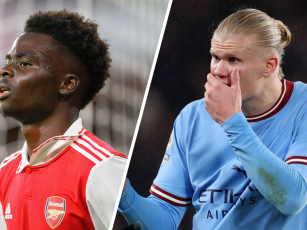John Duggan writes that an inconclusive debate about the best season of any club highlights that a soul still exists within English football.
Which English top flight club has clearly enjoyed the best ever season against their peers?
I don't know what the answer is. Do you? There is no definitive answer. It surprised me somewhat that there were so many differing arguments in the wake of Manchester City's title win this week.
Competitive football did not begin with the Premier League in 1991-92; those of us old enough to remember the great rivalries before that - Liverpool and Everton in the 1980s - Leeds United and everyone else in the late 1960s and early 1970s - will recall close finishes and outstanding performances by clubs.
However, the Premier League has raised the bar. It has become a global brand suffused with exciting title races and performances of a distinct quality.
The very first club to win an English First Division, Preston North End, did so without losing any of their 22 games in 1888.
For many people, Arsenal's unbeaten achievement from 38 games in 2003-4 stands out as the benchmark for the best ever campaign. It's easy to support the claims of the unblemished season from the 'Invincibles', but the Gunners did draw 12 times that season. Their tally of 90 points was 10 points fewer than Manchester City's record haul of 100 points, achieved 14 years later.
I would argue that 2018 or this week does not represent City's high point. To me it would be 2019, when they finished with 98 points to Liverpool's 97 in a title race for the ages - two teams playing fantastic, progressive football in a year when England produced the Champions League and Europa League finalists.
Another wonderful title race was in the 1998-9 season, as Manchester United beat Tottenham Hotspur 2-1 on the final day to pip Arsenal on a total of 79 points to 78, with Chelsea back in third place on 75 points. This was United's treble year, so they did all of that while shaking off the challenges of Juventus in the Champions League semi-final and Arsenal in the FA Cup before winning the European Cup in Barcelona.
United's ability to succeed on all fronts illuminates that 1999 Premier League crown as special, but was it better than 2000, when they amassed 91 points and thumped Arsenal by 18 points? Or 2008, the year of their second Champions League victory under Alex Ferguson, when they edged a quality Chelsea team down the stretch domestically and in Europe?
Where does Chelsea's 2004-5 performance under Jose Mourinho rank, a season in which they conceded only 15 goals? Was it better than Liverpool's feat in 1978-9, a side that let in only 16 goals from 42 games?
What about clubs like Tottenham Hotspur in 1951 and Nottingham Forest in 1978 that won their titles the seasons after getting promoted? Does the miracle of Leicester City in 2015-6 dwarf any other moment in football history due to the financial disadvantage they overcame, or should it be viewed as a freak season?
Liverpool only lost two games in the entire 1987-8 season, but there was no European football to contend with and it may be right to claim that before the pandemic unexpectedly intervened, Jurgen Klopp's Reds of 2019-20 were on the verge of unique greatness.
They had collected 82 points from their first 29 games, an average of 2.83 points per game and if the health crisis hadn't ground everything to a halt, their momentum surely would have brought them past City's record of 100 points. Instead, they got to 99, the weight of life and a 30 year wait for a league title arresting that momentum.
So perhaps Liverpool is the answer. Or maybe not.
What is the answer is that despite the billionaire influence in the Premier League and football globally, a spirit of competition still exists in England to keep the masses entertained around the world.
Football, like all enterprises rooted in capitalism, is now engulfed in a war for its soul between the ordinary supporters and rapacious owners. The ill-fated European Super League, with its closed shop and focus on global television audiences rather than supporters, would have destroyed an already frayed moral and spiritual contract between fans and the sport.
Football is awash with money to an absurd and uneven degree and many would argue that the game lost its soul a long time ago, but people are still connected to seeing beautiful football, even if it's a Champions League Final between a club owned by the UAE and another club owned by a Russian oligarch. We are still motivated to plug our passions into this show and consume it. The stupendous Premier League broadcasting contracts tell you all you need to know. We are all fans with our own opinions, team, lifetime legacies of support and identity. We all want to rubberneck the show each day, but we want to do that from a sense of belonging.
The Premier League campaign which is drawing to a close has seen Leicester beat Manchester City 5-2; it has brought the novel storyline of West Ham's best season in years; while Arsenal and Tottenham struggle and Newcastle fight on to live another day.
Pep Guardiola put it best recently when asked about the Super League.
“It is not a sport where the relation between effort and success does not exist," he said.
"It is not a sport where success is already guaranteed. It is not a sport where it doesn’t matter when you lose.”
The odds will predict that with owners with unlimited pockets, the best players and the best manager, City should be the most successful club in the world. It's likely, but it's not a given.
The corrosion of football due to money is why I love the international game more than anything else. Lionel Messi or Cristiano Ronaldo are not guaranteed success with their country. The two clubs these wonderful footballers play for, Barcelona and Juventus, are at this point questionable going concerns, reflective of a bursting bubble.
Club football retains its soul, and debating who was the best champion in England on OTB or on Newstalk is a fun reminder of that. However, it's obvious to me that the game is at a tipping point and one hopes that the demise of the ESL and responsible protests will lead the stakeholders in the game to dream of a better way, a more equitable and inclusive model to level up the playing field and deliver enthralling competition in a more respectful, durable and connected manner with fans.
So we can have something to debate about during the next generation.
Download the brand new OffTheBall App in the Play Store & App Store right now! We've got you covered!
Subscribe to OffTheBall's YouTube channel for more videos, like us on Facebook or follow us on Twitter for the latest sporting news and content.








